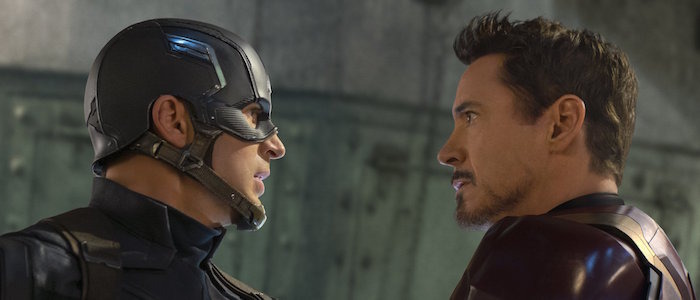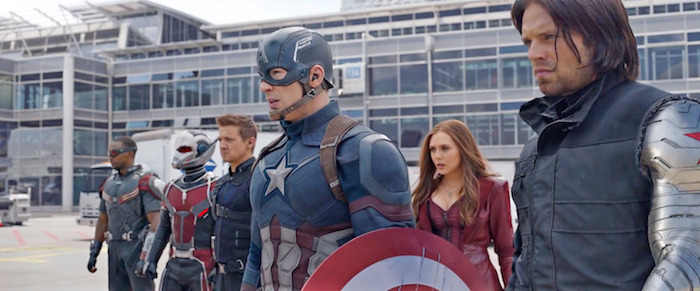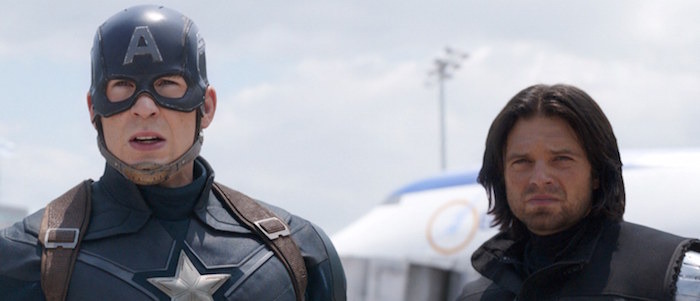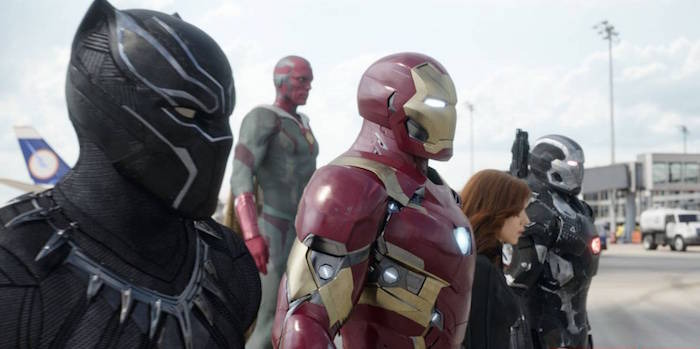'Captain America: Civil War' Is Marvel's Harrowing Longterm Payoff To Years Of Storytelling
(Welcome to Road to Infinity War, a new series where we revisit the first 18 movies of the Marvel Cinematic Universe and ask "How did we get here?" In this edition: Captain America; Civil War pays off years of build-up with a painful bang.)
The Marvel Cinematic Universe seems to re-invent itself every couple of years. From big, fun crossover action to space-set family soap opera, it's been laying track one way or another for the upcoming Avengers: Infinity War, but a decade of narrative investment can't be achieved without a feeling of genuine loss. This year's culmination re-introduces us to the scattered Avengers, a family at its most discordant after tearing itself apart.
And while no Avengers lost their lives in Captain America: Civil War, the team as a whole may have lost its sense of identity. It's a film where the long-term personal and political narratives boil over, conflicting with one another for reasons both idealistic and petty, and by the end of it, the Avengers implode. It's a difficult watch at times, even and especially two years later when debates about military intervention rage on. And while it may seem like folly to view a film from 2016 strictly through a lens of America's 2018 bombing of Syria, this particular real-world intervention isn't something new. It's part of a long-standing and long-intervening military apparatus that makes a film like Captain America: Civil War relevant in the first place.
The Avengers' legacy is America's legacy. And it's mighty complicated.
The Soldier and the Futurist
In Civil War, Captain America's journey away from blind nationalism comes full circle, leading him to an unsettling place where he represents American militarism once more. It's a difficult scenario, one the film acknowledges as such by placing this well-meaning protagonist in a predicament against his equally well-meaning teammates, none of whom are particularly wrong.
After a botched mission that results in civilian causalities, the Avengers are finally put on notice by the American Secretary of State – a returning Thunderbolt Ross (William Hurt) from The Incredible Hulk, a man all too familiar with the dangers of unchecked power. 117 countries come together to sign the Sokovia Accords, placing Steve Rogers and his team under U.N. supervision. It makes sense; in theory, a U.S.-based private paramilitary organization has no business running unchecked missions on foreign soil, especially when they're half the reason these villains crop up in the first place.
Captain America, however, isn't so keen on being supervised. Not out of some vaguely jingoistic notion of "freedom," but precisely because he's seen the American agenda change in The Winter Soldier, leaving him at a complicated nexus. He is, at once, opposed to the U.S. governmental idea of militarism as well as its very embodiment.
In Avengers: Age of Ultron, Tony Stark created the antagonistic A.I. that nearly destroyed the world. Time and time again, he's seen technology like his fall into the wrong hands, and when confronted with the death of an individual in Sokovia – Charles Spencer, a young man on a mission to build affordable housing – a death that came at the hands of the Avengers' own battle with Ultron, Tony's guilt finally forces his hand. No more private militarization. No more unilateral intervention. The Avengers need oversight, but under whose authority should they be? The group wouldn't be necessary in an ideal world, the kind of world Stark has been trying to create after scaling back his weaponry, but the old world of war and misery is one he helped create.
For Steve Rogers, doing the right thing means staying a good man. For Tony Stark, doing the right thing means correcting his mistakes. Both men were reminded of these missions by mentors on their deathbeds – Abraham Erskine in Captain America: The First Avenger and Ho Yinsen in Iron Man – and those missions have finally collided. Steve, once a man loyal to the structures of Government, has been forced to turn against the idea. Tony, once a man obsessed with unchecked power, now believes it's time for Governments to take charge. Not only have these men seen the respective follies of their ways, rubbing up against the most dangerous parts of Governmental loyalty and unregulated power respectively, but they now see the very worst parts of their past decisions within each other.
The Personal Behind the Political
Per the words of the late Peggy Carter, Steve must remain an uncompromising protector, responding to those telling him to move with a resounding "No. You move." When Black Panther tells him to move, he doesn't. When Iron Man tells him to move, he still doesn't. He knows that people need to be protected, and he can't wait for their safety to be debated by committee. This is a lessons Steve carries forward in a strange new world he doesn't understand, and it comes from the last remaining connection to his past outside of Bucky, a man who may not remember him.
But for Tony Stark, a man continually trapped by trauma and past mistakes, the guilt of his actions has become too much to bear. No matter how much he re-lives the past – like his final conversation with his parents, via his virtual reality technology – he's unable to change it. When confronted by the mother of Charles Spencer, who blames him for her son's death, all he can do is look to the future.
The Accords aren't just a political document. They're a means for Tony Stark to prevent more damage to his soul. He was America's military industrial complex, and now he's a superhero unable to find a way to move past the destruction he's still causing. Getting the other Avengers to sign the document may not prevent future tragedy – as Steve rightly asks, what if they aren't where they need to be, or sent somewhere they shouldn't be? – but it's a step that shifts the responsibility away from him and his team. Would Wanda's civilian casualties in the name of protection have been any less tragic if, say, the U.S. Congress had approved their mission to Lagos?
Similarly, even when Steve might consider signing the Accords, he's forced out of his decision by external factors that feel personal to him, whether it's Tony imprisoning Wanda at the Avengers' compound, or military forces going after his wrongly accused friend, Bucky Barnes. He knows Bucky to be innocent, both for his prior crimes in which he was denied autonomy, and for the recent U.N. bombing that killed Wakanda's King T'Chaka, in which Bucky was impersonated. Signing the Accords at first could lead to military forces shooting to kill his friend. Following the Accords later could mean the manipulative Helmut Zemo (Daniel Brühl) re-awakening half a dozen other Winter Soldiers in Siberia before the Avengers can stop him, leading to a destructive force far deadlier than Bucky had ever been.
If Steve waits to be taken in, or waits for a committee to decide on whether or not to intervene, the world could be at risk. If Tony doesn't stop Steve from his reckless Siberia mission, Bucky could cause further harm and the Avengers could be shut down for good. This is why the massive airport fight ensues, between those loyal to Captain America (Bucky, Falcon, Wanda, Hawkeye and Ant-Man) and those who have fallen in line with Iron Man and the Accords (War Machine, The Vision, Black Widow, Spider-Man and Black Panther). While both parties are "right" from their own perspective, each self-justified in their various actions even though the audience knows Team Captain America to be "in the right" at this point (and knows Iron Man & co. to be wrong about the terrorist attack attributed to Bucky), the film's ensuing rug pull reveals both sides to be factually wrong.
In effect, they aren't fighting for the people anymore. They're just fighting.
Mission Report, December 16, 1991
Zemo's mission is a complicated one. It depends on dozens of moving parts and precise decision-making on behalf of the Avengers. He claims to have studied them for a year, so we may as well roll with it; the point isn't so much that his plan comes together despite its real-world improbability. Rather, it's that it comes together as if narratively inevitable. It's rooted entirely in who these character are.
Zemo has forced Iron Man and his newfound side of authority to believe they're after a terrorist. He has made Captain America believe his friend, who blinds his decision making, is in danger. And he has made the side of anti-authority, gung-ho go getters believe their actions will prevent further catastrophe in the form of future terrorists.
But Bucky is not the real terrorist, and Zemo has no plans to re-awaken the other Winter Soldiers. As complicated as the Avengers' debate on security may be, and as harrowing as it is to see two great heroes placed at odds as they represent differing political stances, Zemo has taken advantage of the nature of their predictable, one-track heroism. The two sides clash at a Leipzig airport because they have each been made to believe a different terrorist narrative. They are placed predictably at odds with one another because even their differing outlooks are sides to the same coin. One team retaliates without complete information, the other fights on the false presumption of future threat, and destruction ensues.
Zemo has personal reasons for causing this mayhem. His family was killed in Sokovia during the events of Age of Ultron, and as a means to make Captain America and Iron Man tear each other apart, Zemo lures them into the isolated facility of Bucky's Siberian origin. Here, he reveals the truth hinted at by Arnim Zola in The Winter Soldier; that it was Bucky who, while under the influence of HYDRA, killed Tony Stark's parents to prevent them from assisting American war efforts. The man Steve has been protecting was the very person responsible for Tony's deepest wounds.
While the political specifics are stripped away by this point, as both sides have come to realize the lies that brought them here, the personal perspectives driving them are now magnified. Tony Stark, who's spent years trying to regain a sense of order and control, is now faced with the man who stole his sense of equilibrium years ago. And Steve Rogers, who has spent the entire film protecting Bucky because it's the right thing to do, now has to protect him from what may very well be righteous vengeance. Tony is right. Steve is right. And they tear each other apart.
With the question of Bucky's guilt or innocence hanging in the balance – How accountable is a brainwashed soldier for crimes he believed to be righteous? – the selfishness driving each man's high-minded ideals comes to the forefront. What good is Steve's desire to do right by his friend when it's hurting the other Avengers? What good is Tony's newfound adherence to law when he breaks it himself? What good are these debates on security when they're being had by wounded individuals driven by personal ideology rather than common good, deciding on the means by which to attack rather than ceasing their violent crusades altogether?
The Long Game
Apart from Black Widow, who's woefully short-changed here after two stellar appearances, every character in Civil War gets a coherent story. Sam Wilson, the former military airman who's seen American government be twisted, takes Steve's side. James Rhodes, the current air force recruit whose 130+ missions have prevented catastrophe, takes Tony's. They each side with heroes that represent their respective worldviews despite the conflict's personal undercurrent, and they each pay the physical price. Wanda and The Vision battle on opposite sides despite their common mysterious origin, the Mind Stone. Wanda fights to make a difference and escapes her confines despite her guilt holding her back (Hawkeye, once again, convinces her to stand up for herself), whereas The Vision knows Wanda is volatile. He sees it has his duty as an objective, higher being to protect the Avengers, throwing equations their way and calculating what decisions they should make "for the greater good." But it's the realization of his own humanity, that his own perspective is informed by emotion and that he's prone to error himself, that makes him back out of the fight.
Neither side is objectively right.
Even newcomers Spider-Man and Black Panther receive their due. Young Peter Parker is recruited into battle by Tony Stark, delivering a version of his "With great power comes great responsibility" line. What works about Peter's perspective and morality is that he's removed from the conflict entirely. He likely doesn't know about Sokovia Accords, and yet his outlook applies to both sides. When you have the power to prevent catastrophe, and you don't, the resultant harm is your fault. This holds true for both warring parties, locked in a debate about what power to lean on in the first place: the power to legislate when to act, or the power to act without legislation.
Black Panther on the other hand, while involved deeply in the political turmoil, turns his gaze toward personal vengeance. His mission is to kill Bucky Barnes, the man he thinks responsible for his father's death, but unlike Iron Man and Captain America, he comes to his senses. He sees his own vengeful quest reflected in both Zemo, whose obsession has led him to madness, and in Steve and Tony, who descend into senseless violence. He chooses justice instead, capturing the man responsible rather than leaving him to die.
These ideas are ether set up in previous films or paid off in solo sequels (Spider-Man: Homecoming and Black Panther especially), and in terms of the long-term narrative driving the film – that of Captain America and Iron Man switching places and perspectives before butting heads – it's the kind of payoff that could only exist in this sort of intersecting shared universe. The film finally confronts the series' haphazard politics, imbuing the franchise with a new reason to be political in the first place. Marvel's muddled politics can no longer simply be a backdrop or setting for the heroes to respond to. In stories of militarism that question the use of power, political outlook must be an extension of ethos itself, just as it is in the real world. And while the political perspectives here are just as abstract as they were in previous films – at no time are there specific examples that parallel real-world intervention – the film leans hard on the propaganda and sheer pettiness that often drives these decisions, where even changes of heart aren't enough when they exist alongside lies, and alongside pasts uncontended with.
It hurts to see your heroes fall, and it hurts that it's going to take another alien invasion to bring them back together. But it is their very failures in Captain America: Civil War – failures that tear them apart and reveal the fragile, paradoxical nature of these powerful, intervening beings – that set the stage for them to be better together in Avengers: Infinity War. And hopefully, moving forward, they'll settle on a way to wield their powers responsibly.




